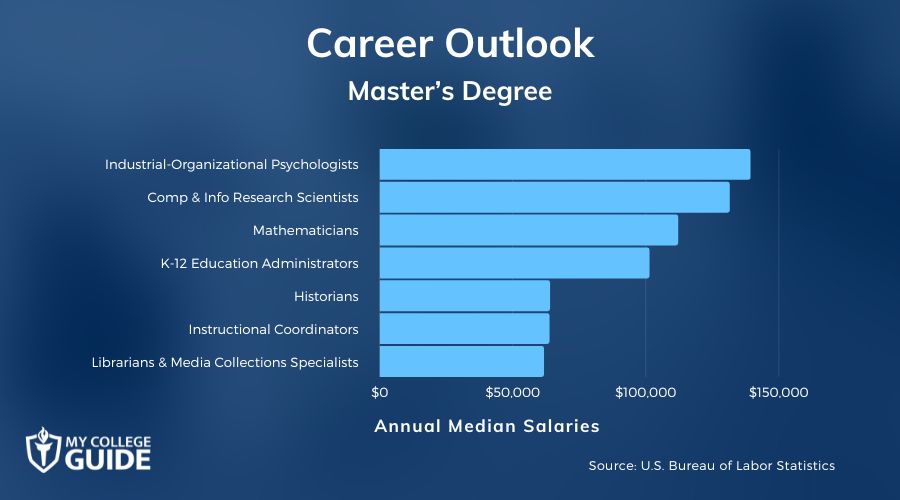What is a master’s degree? If you are asking yourself this question or wondering whether or not a master’s degree is something you want to pursue, then this guide may be able to help.

We’ve created this guide to help you decide if an online master’s degree program is right for you.
Editorial Listing ShortCode:
You can read on to learn what a master’s degree is, explore the different programs available, and discover some of the different reasons to pursue this advanced degree.
What Is a Masters Degree?

A master’s degree is a specific type and level of degree. It is a graduate-level degree that some people choose to pursue after earning a bachelor’s degree. (Note: Some unique programs offer students the option to pursue a bachelor’s and master’s simultaneously.)
It can give candidates a competitive edge when applying for a job, help them earn a promotion or a raise, or enable them to pursue employment in a new and different field.
Editorial Listing ShortCode:
An online master’s degree is the same as a traditional master’s degree but some or all of the coursework is completed online. It typically takes 1.5 to 2 years of full-time study to complete, and during that time you will dig deeper into the field, perhaps even choosing an area of specialization.
There are many reasons people choose to pursue their degrees in masters programs online. In some fields, a graduate degree is required for licensure or for anything beyond an entry-level position. In others, it may not be required but could offer a competitive edge when it comes to earning a promotion or pay raise.
Common Types of Master’s Degrees
There are several types of master’s degrees that focus on different areas of study. Some common master’s degrees include Master of Arts, Master of Science, and Master of Library Sciences. Other master’s degrees offer different approaches to learning, such as Master of Research and Master of Philosophy.
We’ve listed some of the master’s degrees available to pursue below. Select the program that most interests you to jump to that section of the guide:
- Master of Architecture (M.Arch. Programs)
- Master of Arts (M.A. Programs)
- Master of Business Administration (M.B.A. Programs)
- Master of Education (M.Ed. Programs)
- Master of Engineering (M.Eng. Programs)
- Master of Fine Arts (M.F.A. Programs)
- Master of Laws (L.L.M. Programs)
- Master of Library Sciences (M.L.S. Programs)
- Master of Philosophy (M.Phil. Programs)
- Master of Public Administration (M.P.A. Programs)
- Master of Public Health (M.P.H. Programs)
- Master of Public Policy (M.P.P. Programs)
- Master of Research (M.Res. Programs)
- Master of Science (M.S. Programs)
- Master of Social Work (M.S.W. Programs)
You can explore these programs to see which ones best match your interests and goals.
Master of Architecture (MArch Degree)

A Master of Architecture is a professional degree that prepares students for professional accreditation and licensure. Because students may come into this program with undergraduate degrees in any field, there is a particularly wide breadth of knowledge and experience within the student body.
Editorial Listing ShortCode:
You may specialize in commercial architecture, residential architecture, landscape architecture, interior and spatial design, green design, or urban and regional planning.
Master of Arts (MA Degree)

Master of Arts degree programs focus on studies related to the arts and humanities. While some fields within the arts require a PhD to reach top career positions, an MA degree can be a great step for many toward a professional and potentially lucrative career.
Editorial Listing ShortCode:
There are many different fields in which an MA may be pursued. Some popular ones are visual arts, communications, education, literature, languages, history, and music.
Master of Business Administration (MBA Degree)

An MBA is a versatile degree focused on business and management that is often pursued by mid-career professionals. Most programs require 1 to 3 years of experience.
Editorial Listing ShortCode:
MBA students may choose an area of specialization that is applicable in many industries or one that is specific to one particular industry. MBA degree program specializations are available in many areas, including accounting, advertising, business management, economics, healthcare management, human resources, and project management.
Master of Education (MEd Degree)

A Master of Education degree program prepares students for a career in education. It can help open the door to specialized, higher-paying positions inside the classroom or administrative and leadership roles.
Editorial Listing ShortCode:
You may specialize in educational leadership, English as a second language, literacy, special education, sports coaching and leadership, or STEM education.
Master of Engineering (MEng Degree)

An ME or MEng is a graduate degree in the field of engineering. At some schools, the program is more academic – heavy in research and theory and designed for students who will continue on to PhD programs.
Editorial Listing ShortCode:
At others, it is more professional – focused on practical coursework and preparing students for work in the engineering field. Some are a combination of both. You may specialize in biomedical engineering, construction and engineering management, robotics, sustainable infrastructure, software, or transportation engineering.
Master of Fine Arts (MFA Degree)

An MFA focuses on creative studies. In many cases an MFA is a terminal degree, meaning it is the highest degree available in the field. Admission requirements for an MFA program often include a portfolio of work or a performance audition.
Editorial Listing ShortCode:
An MFA can be earned in a variety of fine arts, including graphic design, creative writing, visual arts, theatre, cinematography, photography, and dance.
Master of Laws (LLM Degree)

A Master of Laws is a secondary degree available to lawyers who have already passed the bar exam. The program serves as a scholarly credential for those who want to gain expertise in a particular area of US or international law.
Editorial Listing ShortCode:
You may specialize in agriculture and food law, corporate law, environmental law, estate planning, intellectual property law, international taxation, or legal theory.
Master of Library Sciences (MLS Degree)

A Master of Library Sciences is designed to prepare professionals to work in library settings. The degree can be useful for a career as a librarian, library director, library manager, or library media specialist. Some Master of Library Sciences programs may go by different titles, such as Master of Library and Information Science.
Editorial Listing ShortCode:
The curriculum explores topics in information technology, research methods, information management and organization, and roles and responsibilities in information services and library settings.
Master of Philosophy (MPhil Degree)

A Master of Philosophy is typically heavily research-oriented, but some portions of the coursework may be taught in lectures and seminars.
Students interested in pursuing a PhD may consider an MPhil degree because it largely focuses on independent study and typically works toward the development of a thesis. The structure of the degree is often very similar to a doctoral program but not quite as extensive.
Editorial Listing ShortCode:
Some program options that may be offered with an MPhil degree include archaeological science, architecture, astronomy, and history. The degree can be useful for a career in research or academia.
Master of Public Administration (MPA Degree)

A Master of Public Administration is a prestigious credential for leaders in the public and nonprofit sectors. This program focuses on the design and implementation of public policies to reach specific goals within the government, non-governmental organizations, non-profit organizations, or other sectors.
Editorial Listing ShortCode:
The training and coursework for an MPA often overlap with Master of Public Policy (MPP) programs, so some schools have combined the two. In an MPA degree program, you may specialize in non-profit management, criminal justice, international affairs, public policy, emergency management, or community development.
Master of Public Health (MPH Degree)

A Master of Public Health explores how to improve the health of various populations through awareness, education, and policy.
Editorial Listing ShortCode:
Specializations in this field include epidemiology, disaster management and emergency preparedness, global health, women’s and reproductive health, child and adolescent health, and nutrition and health.
Master of Public Policy (MPP Degree)

A Master of Public Policy is a prestigious, multi-disciplinary program that focuses on policy analysis and evaluation. Graduates may work for the government, in non-profit organizations, in the private sector, or as consultants.
Editorial Listing ShortCode:
The training and coursework for an MPP often overlap with Master of Public Administration (MPA) programs, so some schools have combined the two. In an MPP program, you may specialize in environmental policy, health policy, urban policy, economic policy, education policy, or public and nonprofit management.
Master of Research (MRes Degree)

A Master of Research is similar to an MPhil degree because it mainly focuses on research-based coursework that may prepare you for a doctoral program or be applied to research careers.
Some MRes degree programs are combined with doctoral programs. A combined program would allow you to work toward earning your doctoral degree while also completing your master’s. Continuation into the doctoral segment of the combined program can depend on performance and other factors.
Editorial Listing ShortCode:
The main focus of the curriculum typically includes learning about research methods in your chosen discipline. Some areas of study that can be applied to an MRes degree include computer science, healthcare data, and biological sciences.
Master of Science (MS Degree)

A Master of Science typically focuses on studies related to science, technology, or mathematics – the STEM fields.
In some cases, a field may fall under both the arts and sciences categories, with some schools offering an MA and others offering an MS. Generally speaking, the programs are equivalent, but in some cases, the MS program may have a stronger research component.
Editorial Listing ShortCode:
There are many fields of study in which a Master of Science may be pursued, including computer science, finance or accounting, engineering, IT, marketing, business, or economics.
Master of Social Work (MSW Degree)

A Master of Social Work prepares students for careers focused on improving the health and well-being of individuals, families, and communities.
Some MSW programs offer two pathways. One is for those who intend to provide specialized counseling in clinical settings. The other is for those who are more broadly focused on public advocacy or community organization and may work as administrators, researchers, or policymakers.
Editorial Listing ShortCode:
In an MSW program, you may specialize in children and families, medical and psychiatric social work, mental health, organization and community practice, social justice and diversity, or disaster, crises, and intervention.
Master’s Degree Careers & Salaries

A master’s degree may provide you with a competitive edge or help you enter a career in your desired field. According to the Bureau of Labor Statistics, these are the annual median salaries of some careers that typically require a master’s degree for entry:
| Careers | Annual Median Salaries |
| Industrial-Organizational Psychologists | $139,280 |
| Computer and Information Research Scientists | $131,490 |
| Mathematicians | $112,110 |
| K-12 Education Administrators | $101,320 |
| Historians | $63,940 |
| Instructional Coordinators | $63,740 |
| Librarians and Media Collections Specialists | $61,660 |
| Healthcare Social Workers | $60,280 |
| Educational, Guidance, and Career Counselors and Advisors | $60,140 |
| Archivists, Curators, and Museum Workers | $50,120 |
Some positions may be attainable with just an undergraduate degree, but many employers highly value an advanced degree for these careers. Your specific salary will depend on a number of factors, including your location, work experience, academic performance, and demand.
A master’s degree may help you build upon your critical thinking, decision-making, and research skills. Along with developing these skills, a master’s degree can be beneficial if you’re looking for a career change or wish to advance into a leadership position by gaining expertise in your current field.
Should I Get a Masters Degree?

Perhaps you’ve been wondering, “Should I get a master’s degree?” One way to consider your options is to consider the advantages of earning your master’s degree.
Master’s degrees often offer the following advantages:
- Opportunity to advance in your career or enter into a new career, especially those that require a master’s degree
- Salary increases
- Chances to dig further into studies you are passionate about
- Greater job security and an edge in the job market
And with online master’s degrees being more available than ever, you may be able to earn your degree quicker and easier than you thought possible. Many programs offer flexible scheduling, accelerated classes, and the ability to study at your own pace.
Choosing an Online Master’s Degree Program

It can be overwhelming trying to research all the different types of online master’s degree options and majors. There are some key components of master’s programs that you can look for to help narrow down your choices, such as:
- Cost of tuition
- Number of credit hours required
- Semester schedule and learning format
- Student services offered
- Accreditation status
Finding a master’s program that offers affordable tuition rates can be beneficial if you want to stay within a specific budget.
The number of credit hours can influence the cost of tuition and the time it takes to complete the program. Some programs offer different semester schedules that can typically be completed in 2 years or less. You can also look into what kind of student services a college or university offers to get the most out of your educational experience.
Editorial Listing ShortCode:
Student services that may be offered include career planning, tutoring, and access to various resources to help with your studies.
Admissions Requirements

Graduate admissions offices typically require students to submit proof of a bachelor’s degree from an accredited institution, along with some of these common master’s degree requirements:
- All official transcripts
- Minimum GPA (only some schools require it)
- GRE or GMAT scores (only some schools require them)
- Resume or curriculum vitae
Official transcripts from previous educational programs are requested to review completed coursework. Some schools may have minimum GPA requirements and consider your GPA to determine admissions eligibility.
The GRE and GMAT are standardized examinations used to determine your graduate school preparedness, but many institutions no longer require these scores.
Graduate Programs Accreditation

Colleges and universities can seek institutional and programmatic accreditation to prove that they meet and maintain quality educational standards.
Regional accrediting organizations award accreditation to postsecondary institutions after a rigorous review is conducted, proving that the institution aligns with a set of criteria. Some accrediting organizations dedicate their accrediting services to specific programs of study, such as psychology or nursing.
Accreditation can impact financial aid, graduate admissions, and employment opportunities. The US Department of Education has a database of accredited postsecondary institutions and programs to help you find the accreditation status of prospective schools.
Financial Aid and Scholarships

Federal financial aid is one of the most common types of financial assistance a student may receive to help pay for college.
Financial aid can come in many forms, including loans, scholarships, grants, and work-study programs. States can also award different forms of aid. To apply for federal aid, you can submit a Free Application for Federal Student Aid (FAFSA) via the US Department of Education.
Scholarships can be awarded by the government or various organizations that support and advocate for higher education. Work-study programs help students find part-time jobs to help pay for college expenses.
What Masters Degree Should I Get?

While you may be most familiar with Master of Arts (MA) and Master of Science (MS) degrees, there are many other master’s degrees aside from these options, such as:
- Master of Education (MEd)
- Master of Business Administration (MBA)
- Master of Public Administration (MPA)
- Master of Fine Arts
The type of master’s degree you should get ultimately depends on your personal interests and career goals. If you want to focus your studies on the arts and humanities, an MA may be a good option. If you’d like to focus on a STEM-related field, you might wish to earn an MS.
Each type of degree is designed to prepare students for certain fields, such as business, education, public administration, healthcare, or the sciences.
How Many Credits for a Masters Degree Online?

The number of credit hours required to complete a master’s degree online can depend on the college or university and program of study. It can also depend on the type of master’s degree you choose to pursue.
Editorial Listing ShortCode:
Online masters degree programs generally require anywhere between 30 to 60 credit hours to complete, but some programs may require less or more. One course usually equals three credit hours. The number of credit hours required for a program can affect how long it takes to complete.
What Can You Do with a Masters Degree?

A master’s degree can be beneficial for pursuing a leadership position in your desired career field or preparing for a doctoral program.
According to the Bureau of Labor Statistics, some careers that typically require a master’s degree for entry include counselors, economists, nurse anesthetists, archeologists, and postsecondary teachers. Master’s degree programs typically teach theoretical approaches in the chosen discipline and practical research methods.
You can also pursue a master’s degree to gain an advanced set of skills and expertise in your current field.
How Much Does a Master’s Degree Cost?

The cost of tuition for a master’s degree can widely vary depending on the type of degree, major, and college or university.
Private colleges typically have higher tuition rates compared to public institutions, and out-of-state tuition rates are usually higher than in-state tuition. Although tuition varies, you’ll likely pay anywhere between $300 to upwards of $1,500 per credit hour for online graduate programs.
Enrollment status can also affect the cost of credit hours because some institutions offer a flat rate for a defined number of credit hours taken each semester.
How Long Does It Take to Get a Master’s Degree Online?

Online masters degree programs usually take 1 to 2 years to complete depending on the program and enrollment status. A 36 credit hour program can potentially be completed in 1 year of full-time study, including the summer, if no thesis is required.
Programs that require a thesis at the end typically take longer to complete. If the program requires more than 36 credit hours, it may take up to 2 years or more to complete depending on enrollment status. Part-time enrollment will add on extra time.
What’s the Difference between an Undergraduate vs. Graduate Degree?
There are several differences between an undergraduate and a graduate degree, including:
| Undergraduate Degree | Graduate Degree |
|
|
Undergraduate degrees include associate and bachelor’s degrees, while graduate degrees include master’s degrees and doctoral degrees. Typically, undergraduate degrees introduce fundamental topics in a chosen discipline, while graduate degrees explore topics more in-depth.
What’s the Difference between a Masters vs. PhD Degree?
A masters degree and a PhD differ in many ways, such as the following:
| Masters Degree | PhD Degree |
|
|
A PhD is a terminal degree that is usually almost entirely made up of independent study. Many master’s degrees include a portion of independent study, but they typically include other styles of coursework in the form of lectures and seminars as well.
Is a Master Degree Worth It?

Yes, a master degree is worth it for many students. Earning an advanced degree may provide you with more job opportunities and the potential to earn a higher salary.
Editorial Listing ShortCode:
According to the Bureau of Labor Statistics, jobs for those with master’s degrees are expected to grow by 13.6% over the next several years. A master’s degree can potentially make you a more competitive candidate in jobs that only require an undergraduate degree for entry. It can also be beneficial if your desired career typically requires a master’s degree.
Getting Your Masters Degree Online

Earning your master’s degree online can give you the opportunity to gain an advanced skill set and more in-depth knowledge in your chosen discipline.
Whether you’re looking to advance in your current field, change career paths, or pursue a doctoral degree, a master’s degree can be useful in many ways. Some key skills that a master’s degree can help you develop include research skills, analytical thinking, critical thinking, problem-solving, and decision-making.
There are several types of master’s degrees to choose from. You can begin searching for the right master’s degree for you by researching accredited online masters degree programs that best support your interests.
